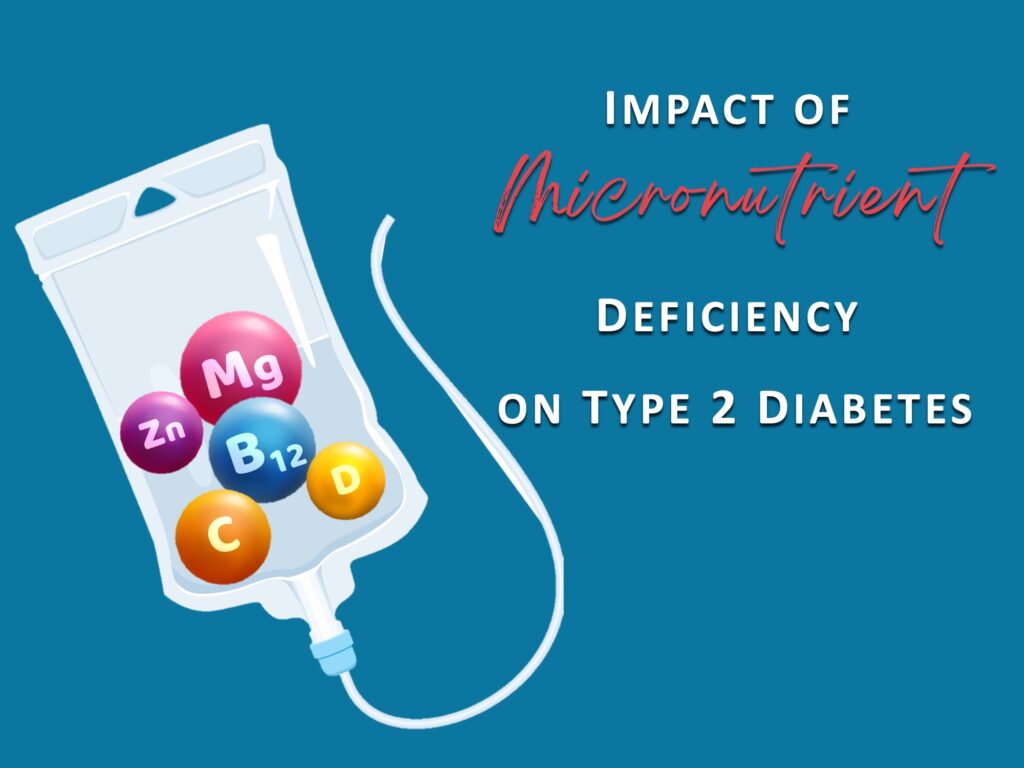
Micronutrients – vitamins and minerals – are essential for overall health, yet they are often overlooked in the management of type 2 diabetes (T2D). While macronutrients like carbohydrates and fats are commonly discussed in diabetes care, deficiencies in key vitamins and minerals can significantly impact blood sugar control, insulin function, and overall disease progression.
Why Micronutrients matter in T2D
Micronutrients play a crucial role in metabolic processes, including glucose metabolism, insulin sensitivity, and inflammation regulation. Deficiencies can worsen insulin resistance, increase oxidative stress, and lead to complications such as neuropathy, cardiovascular disease, and impaired wound healing.
Key Micronutrient Deficiencies in T2D
- Magnesium
- Magnesium is essential for insulin function and glucose metabolism. Low levels are linked to insulin resistance and poor blood sugar control.
- Studies suggest that magnesium supplementation may improve insulin sensitivity and reduce the risk of diabetes complications.
- Vitamin D
- Vitamin D deficiency is common in people with T2D and is associated with higher blood sugar levels and increased inflammation.
- It plays a role in pancreatic beta-cell function, which is crucial for insulin production.
- Chromium
- This trace mineral helps regulate insulin action and glucose metabolism.
- Deficiency may contribute to poor blood sugar control, though supplementation results vary.
- Zinc
- Zinc supports insulin production and has antioxidant properties that help oxidative stress
- Deficiency is linked to an increased risk of diabetic complications.
- Vitamin B12
- Long term use of metformin, a common diabetes medication, can lead to B12 deficiency.
- Low levels may cause nerve damage, leading to diabetic neuropathy
- Other micronutrients whose deficiencies also appear to be associated with T2D are iron, vitamin C, calcium, selenium.
Addressing Micronutrient Deficiencies
The best way to prevent deficiencies is through a balanced diet rich in whole foods. Leafy greens, nuts, seeds, dairy, lean proteins, and whole grains provide essential vitamins and minerals. However, some individuals may require supplementation, especially if they have absorption issues or take medications that deplete nutrients.
Managing T2D isn’t just about controlling carbs – it’s also about ensuring adequate micronutrient intake. Regular screenings, a nutrient-rich diet, and supplementation when necessary can help improve insulin function and reduce complications. If you have diabetes, as always, discuss any micronutrient concerns with your healthcare provider. If you are considering supplementations, one of the best ways to address this is through IV infusion therapy.
Using IV Infusion Therapy for Micronutrient Supplementation
IV nutrient therapy is a quick and easy way of delivering these essential micronutrients that is nearly 100% utilized in the body. IV therapy works by delivering the vitamins and minerals directly into the bloodstream in a bag of hydrating fluids. Therefore, this allows the bypassing of the gastrointestinal tract, where a significant percentage of supplements taken by mouth are not absorbed and are essentially wasted.
IV therapy works by delivering the vitamins and minerals directly into the bloodstream.
Iv SouthEast, iv Savannah and iv St Simons can provide IV infusions of these essential micronutrients. We have 3 locations in the Savannah area, as well as mobile services in Savannah and St Simons that are able to come to your location if you prefer. All service are provided by licensed medical professionals.
Please give us a call to discuss how we can help you, 912-457-8567.
For additional information check out these articles:
- Burden of Micronutrient Deficiency Among Patients with Type 2 Diabetes: Systemic Review and Meta-analysis: https://nutrition.bmj.com/content/bmjnph/early/2025/01/03/bmjnph-2024-000950.full.pdf
- Role of Minerals and Trace Elements in Diabetes and Insulin Resistances https://www.mdpi.com/2072-6643/12/6/1864
- Potential Micronutrient Deficiency Lacks Recognition in Diabetes https://pmc.ncbi.nlm.nih.gov/articles/PMC2032692/pdf/bjpg57-003.pdf
